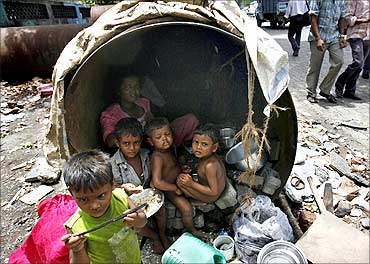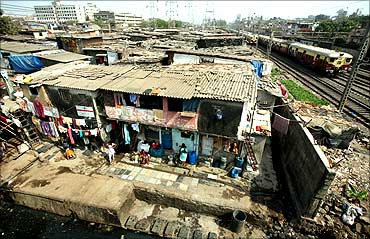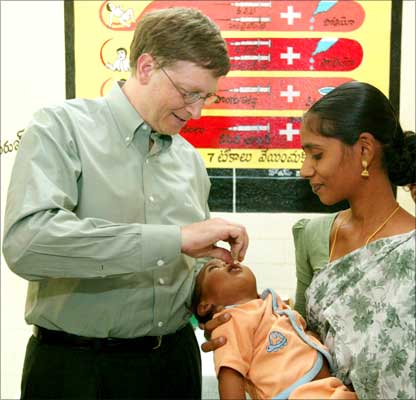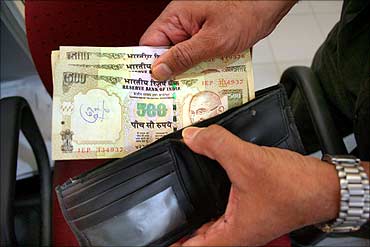
This is the great Indian paradox. The country's economy is booming, with the number of millionaires and billionaires rising by the day. According to a research by Bain & Co, there are over 115,000 high-networth individuals in India.
Since 2000, this elite group has grown an average of 11 per cent annually. Between 2006 and 2007, the number of wealthy individuals in India surged by 23 per cent, which is the highest growth rate in the world.
While this may be good news, here is the other side of the India growth story.
Today, more than 400 million people live below the poverty line in India. The global meltdown has pushed an additional 25 million to 40 million citizens below the poverty line.
So how can a country like India bridge the gap between its rich and poor? Are India's wealthiest people doing their best to reach out to the poorest? Well, the generosity of India's rich population does not necessarily rise with income and education, says the Bain & Co study.
"The wealthiest have the lowest level of giving at 1.6 % of household income. While the 'high class', which is ranked one level below the 'upper class' on the income and education scale, donates 2.1% to charity, the middle class gives 1.9% of household income to philanthropy," says Arpan Sheth, partner, Bain & Company.
Click NEXT to read on. . .

Nearly 40 per cent of the nation's wealth is controlled by the top 5 per cent of India's households. So about 1 per cent controls about 16 per cent of the national wealth, says the Bain study.
The charitable initiatives in India accounted to about $7.5 billion in 2009, according to the study, equivalent to about 0.6 per cent of the country's GDP.
The rate is higher than Brazil's 0.3 per cent and rival China's 0.1 per cent, but lags behind United States which is 2.2% and 1.3% in Britain, the report said.
Why are Indians not generous enough? Click NEXT to read on. . .

There are three major factors that curb philanthropy in India.
Many people who became rich recently are not willing to part with their wealth.
A Bain analysis of 30 high-net-worth individuals in India showed that they contribute, on average, just around one-fourth of 1 per cent of their net worth to social and charitable causes.
Many believe that the funding networks are not professionally managed and their donations may be misappropriated.
Besides this, since most of the companies are family-owned groups, they view corporate responsibility initiatives as a philanthropic step and avoid personal donations.
Click NEXT to read on. . .

It is time for India to be more generous. India can emulate the West in terms of philanthropy, say observers.
"India's powerful economic engine is expected to produce thousands of millionaires in the coming years. There is no reason why our wealthiest citizens should not do more for those with less. India needs their philanthropy," says Bain & Co's Arpan Sheth.
The largest 100 foundations in the US have more than $200 billion in assets. These assets are used to help underwrite philanthropic activities. This massive asset base allows foundations to extend their support throughout the world.
India's foundations can learn valuable lessons from their American counterparts like the Bill & Melinda Gates Foundation. In India alone, it provides more than $1 billion for health and AIDS initiatives, states the study.
Click NEXT to read on. . .

Several other aspects make charity cumbersome and badly organised in India. There are about 2 million charity operators in India.
But most of them are run without the transparency, processes and professional staff required to reassure donors and encourage large contributions, points out Sheth. So India needs more professional and large charity organisations.
Archaic laws and bureaucracy hinder both the growth and operations of non-profitable organisations so there is an urgent need to reform our laws and taxation policies and create a more supportive climate for charitable organisations, he says.The growing number of wealthy Indians gives a ray of hope for better philanthropic activities in future.
"A more equal and less impoverished society benefits every one of us. A healthier, better-educated population means a more secure and prosperous India," Sheth says.